Redditors Support Lady’s Decision To Pay For Her Dog’s Surgery Instead Of Her Mother's
Our doggos have their own ways of exploring the universe. They do this by mouthing, tasting, and chewing, which can potentially lead to them ingesting foreign objects that could be harmful.
When a toy component breaks off or something unexpectedly falls to the ground without the owner's knowledge, puppies may inadvertently swallow these objects. A foreign body obstruction in a dog can be a medical emergency that, if not treated immediately, might cost you money and even your puppy's life.
Therefore, get assistance right away if you think your pet may have swallowed something harmful and they become lethargic, lose their appetite, vomit, retch, have diarrhea, cough continuously, or appear agitated. Any object, no matter how small, has the ability to enter and clog the intestinal tract of these animals.
In today’s story, we see a 23-year-old Redditor who had to use a significant portion of her savings to pay for her dog’s surgery. Why? Her dog swallowed a foreign object that had to be surgically removed.
No problems here, except that the OP’s mom needed surgery, and she had initially told her dad that she didn’t have the money readily available. So you can imagine what happened when the OP’s dad found out that she had paid for her dog’s surgery.
Don’t judge the OP yet until you read the full story.
The headline...

I was forced to pay rent

My parents have good health insurance

The Psychology of Attachment and Loyalty
Dr. Lisa Feldman Barrett, a renowned emotion researcher at lisafeldmanbarrett.com, states, "The way we interact with our pets often mirrors our emotional attachments and can reveal how we prioritize relationships." Many pet owners display behaviors akin to secure attachment, emphasizing emotional connections over social or familial duties. This phenomenon is particularly evident among those who consider their pets as family, indicating a significant emotional investment. Dr. Barrett further notes, "Pets can provide a sense of security and companionship that some may find lacking in human relationships," which may elucidate why individuals sometimes prioritize their pets' needs above those of their human relatives.
Understanding Human-Animal Bonds
Research shows that the bond between humans and their pets can evoke deep emotional responses, often surpassing those experienced in human relationships.
Dr. John Archer of the University of Liverpool concludes that our pets often fulfill emotional needs that may go unmet in our human interactions.
This phenomenon, termed 'companionate love,' can lead individuals to prioritize their pets' needs above other relationships, including familial ones.
My father called me awful names
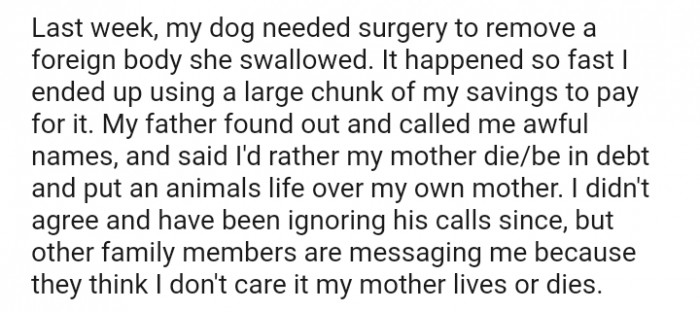
The Reddit thread received hundreds of comments, and we've gathered the topmost comments for you. So keep scrolling and check them out.
1. Your parents wouldn't have helped you
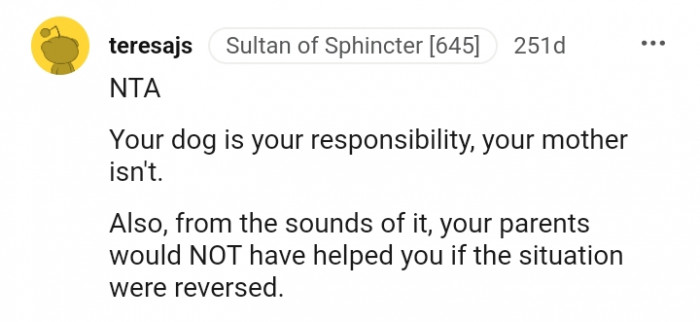
2. They could afford it without you

Interestingly, this scenario reveals much about societal norms and the evolving nature of family structures. In contemporary society, pets are often considered part of the family, leading to conflicts when traditional familial roles come into play. Psychologists note that these conflicts can bring about feelings of guilt or shame, particularly if one feels they should prioritize family over a pet.
According to social psychology research, this kind of guilt can stem from perceived societal expectations about loyalty and care. The pressure to conform to these expectations can create internal turmoil, causing individuals to question their choices, especially when they deviate from traditional norms.
Clinical studies indicate that the attachment to pets can be particularly strong among individuals who have experienced loss or emotional neglect in their lives.
According to research published in the Journal of Personality and Social Psychology, pet ownership significantly reduces feelings of loneliness and enhances emotional well-being.
It's essential to recognize that this deep connection can sometimes lead to complex dilemmas, as seen in the case of prioritizing a pet’s health over a relative’s.
3. Keep your savings for you and your emergencies
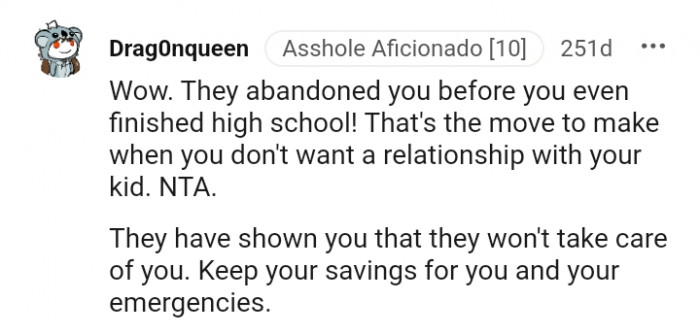
4. This Redditor is listing reasons
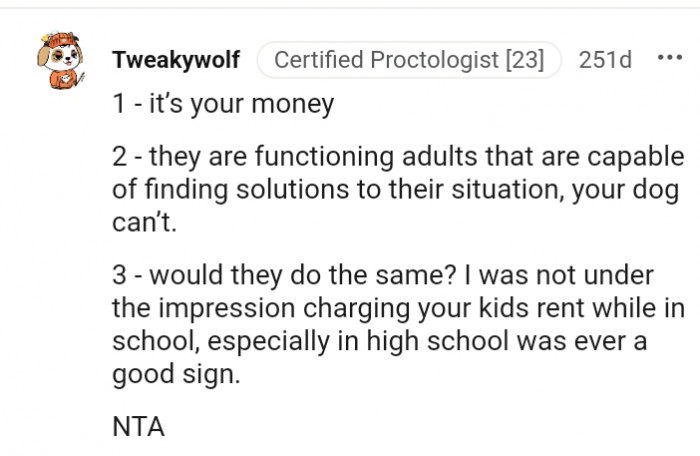
5. They think you're financially responsible for yourself
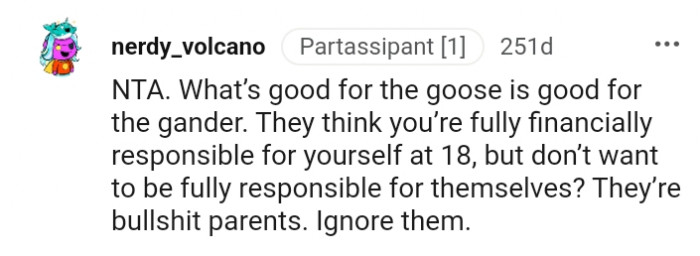
Balancing Relationships and Pet Care
To navigate such complex emotional landscapes, it's essential for individuals to establish clear boundaries and communication with family members. Research indicates that open dialogue about one’s values and priorities can help mitigate misunderstandings. Couples therapy techniques can be beneficial, enabling partners to express their feelings about pet care and family responsibilities without judgment.
Moreover, understanding that different family members may have varying levels of attachment to pets can foster empathy. For example, some individuals might view their pets as emotional support, while others may see them merely as animals. Addressing these differences through compassionate communication can help families find common ground.
The Psychological Implications of Pet Care Decisions
Choosing to prioritize a pet’s medical needs can be influenced by various psychological factors, including guilt, loyalty, and perceived responsibility.
Studies suggest that individuals who view their pets as family members often experience heightened emotional distress when faced with decisions regarding their care.
This emotional turmoil can lead to a reevaluation of personal values and relationships, emphasizing the need for open communication about such decisions.
6. Your dog is your dependent
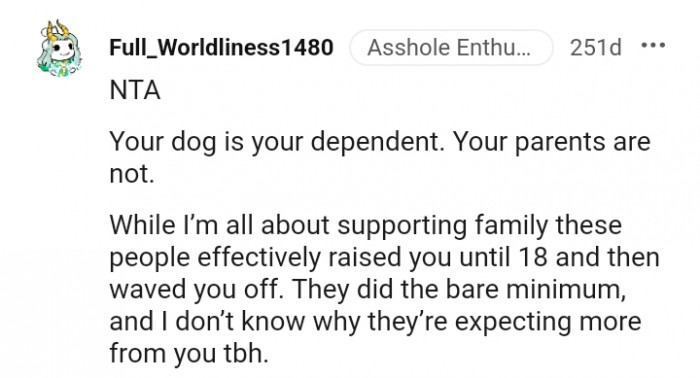
7. Your dog is your family

8. They are welcome to help your parents financially
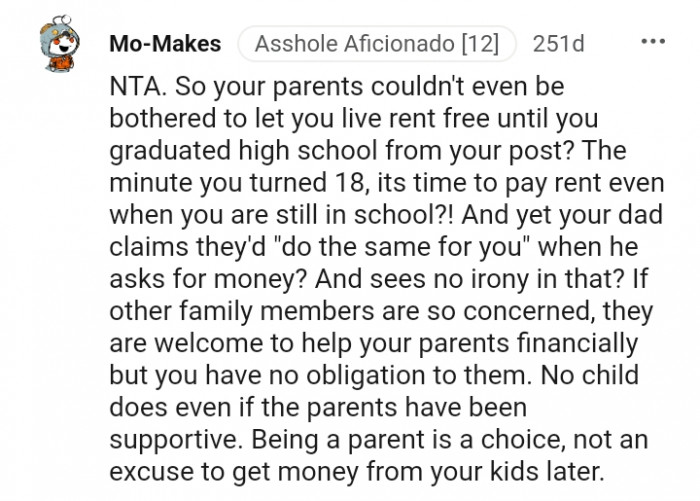
Furthermore, it's important to recognize that prioritizing a pet's health can sometimes reflect unresolved emotional issues. A study by Dr. John Bowlby, a pioneer in attachment theory, illustrates how early attachment experiences shape adult relationships and behaviors. In situations where individuals feel a stronger bond with a pet than with family members, this could indicate a longing for unconditional love that may have been unmet in human relationships.
Exploring these feelings with a therapist can provide insight into personal motivations and foster healthier interpersonal relationships.
It's important to consider practical strategies for navigating these emotional landscapes. Setting boundaries that honor both the pet's and family members' needs can foster healthier relationships.
Engaging in open dialogues with family members about pet care priorities can alleviate misunderstandings and resentment.
Additionally, seeking support from a therapist or joining pet-owner support groups can provide helpful perspectives and coping strategies.
9. Your mother got the care she needed
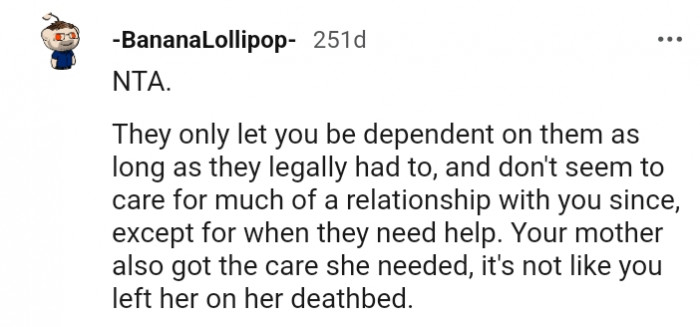
10. An important question that the OP needs to answer

11. You had an unforeseen emergency come up
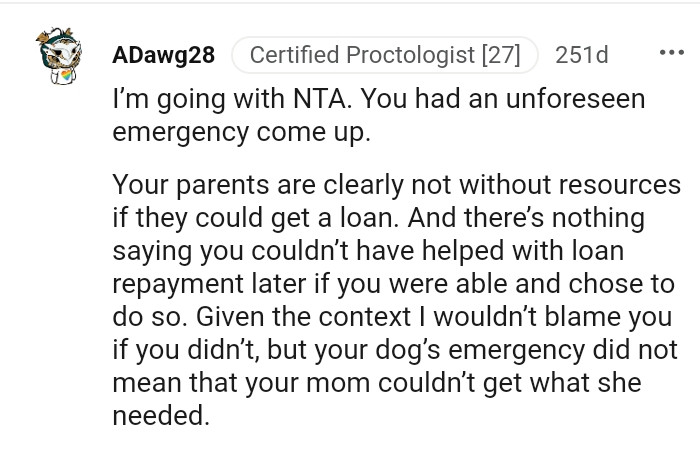
12. You are not responsible for other people
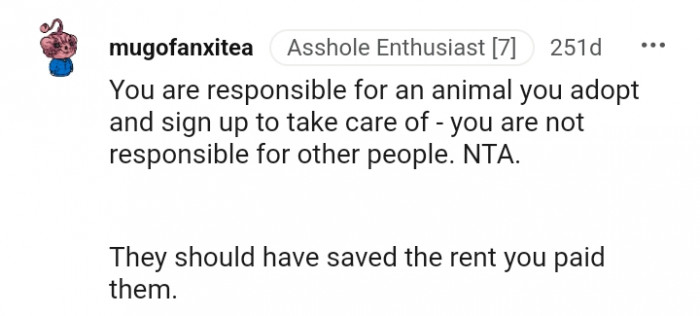
13. They can't have it both ways
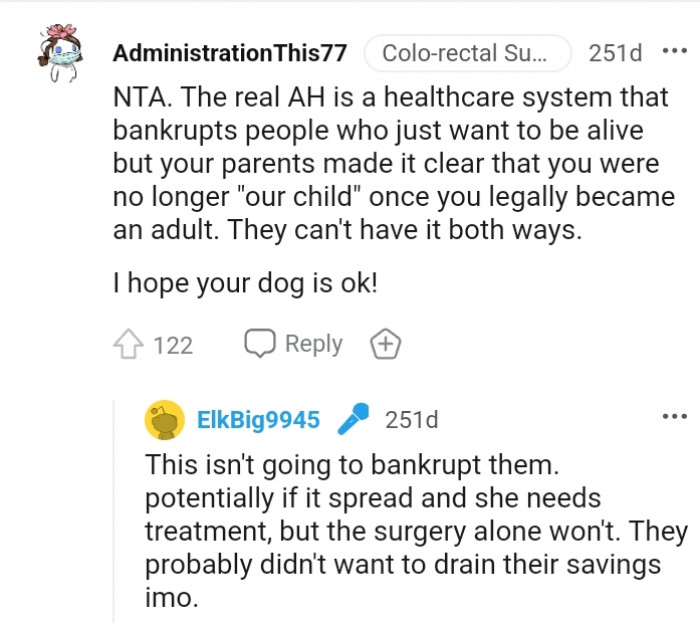
14. As simple as this comment is

15. It's really sad your mom is sick
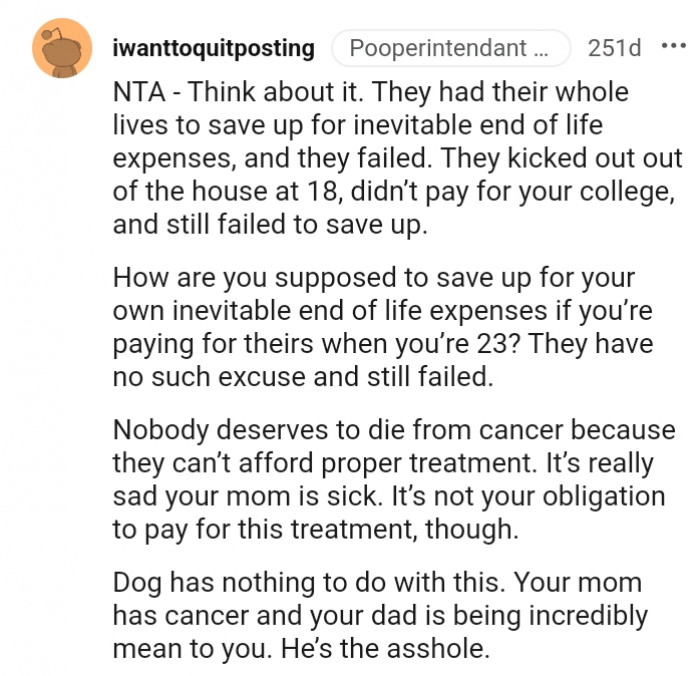
16. "She's your mother and would do the same for you"

17. They didn't need your money
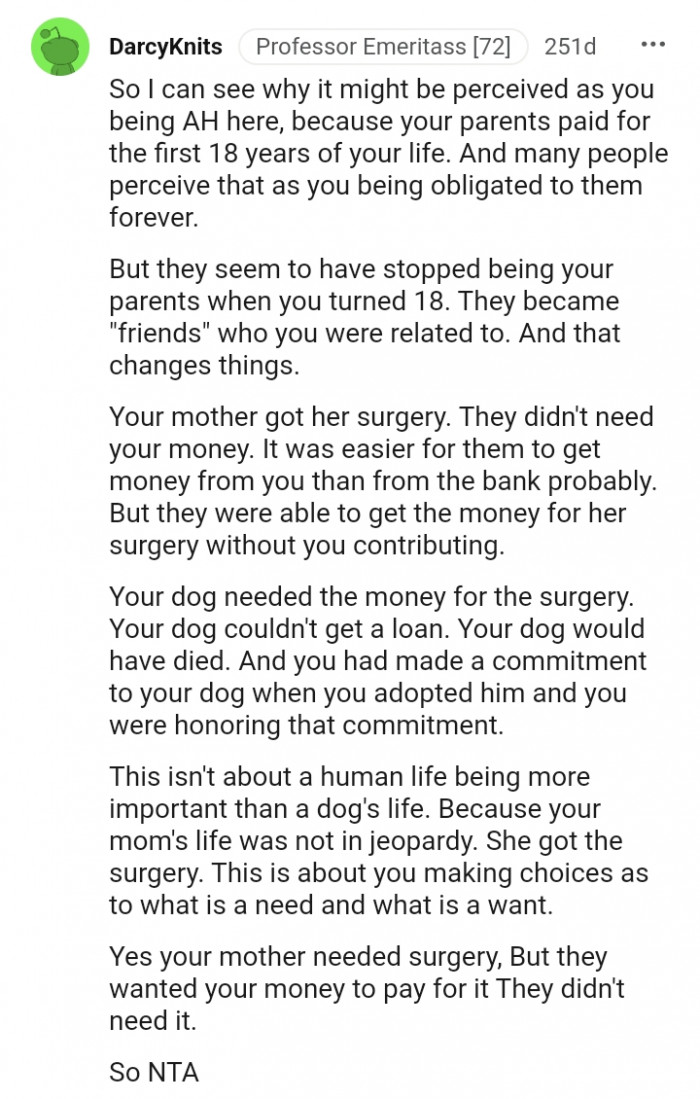
18. You are just an ex-boarder they tried to hit up

19. They did the bare minimum
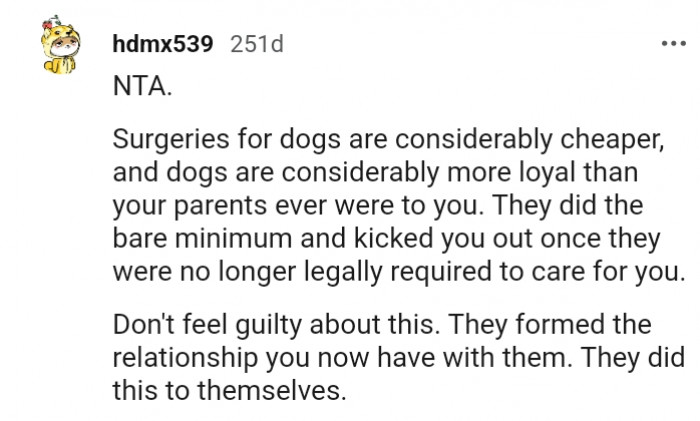
20. The dog relies on you
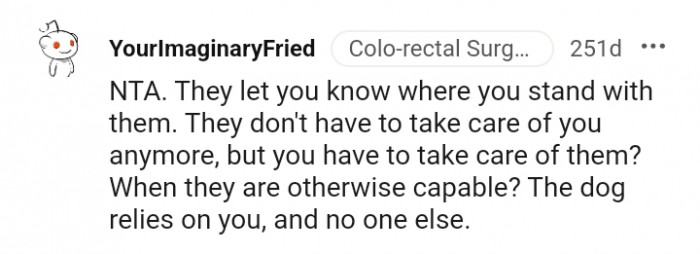
This is just one story among thousands that prove we can do anything to keep our furry buddies with us, and that includes giving up our savings so they can be saved. What would you do if you were in the OP’s situation?
Would you give up your dog just to save your mom? Leave your replies in the comments below.
Psychological Analysis
This scenario reflects the intricate dynamics of attachment theory, where individuals often project their emotional needs onto their pets.
It's essential to understand that prioritizing a pet's needs over a family member's can indicate unresolved emotional conflicts, and addressing these issues is crucial for overall well-being.
Analysis generated by AI
Analysis & Alternative Approaches
Behavioral specialists note that the emotional dynamics involved in pet ownership and care decisions are complex and multifaceted.
Research consistently shows that acknowledging these feelings and seeking balance can lead to healthier relationships with both pets and family members.
Ultimately, understanding the emotional significance of these bonds can help individuals make more informed and compassionate choices.
Analysis & Alternative Approaches
Ultimately, the decision to prioritize a pet's well-being over familial obligations reflects complex emotional dynamics rooted in attachment theory and societal expectations. As mental health professionals emphasize, understanding the underlying motivations can lead to healthier decision-making processes and improved familial relationships.
This journey toward balance requires both introspection and communication, allowing individuals to honor their emotional needs while fostering harmony within their families.



